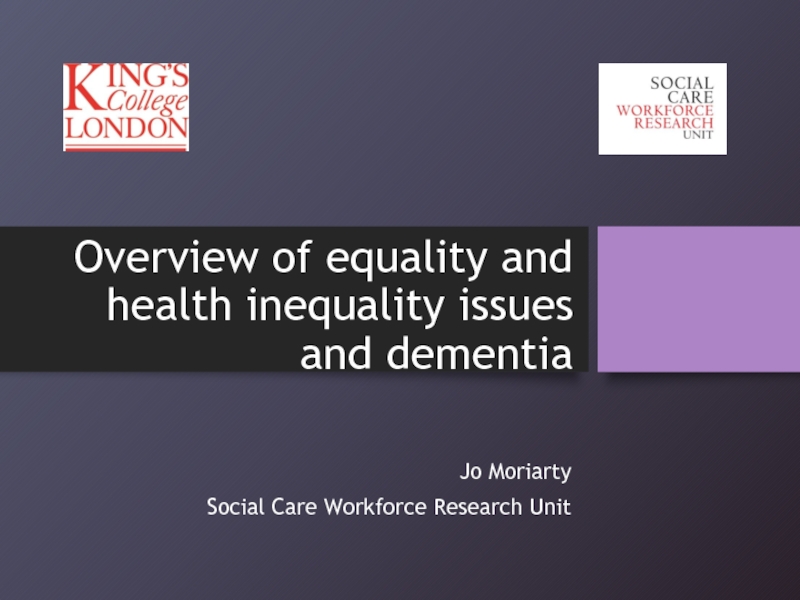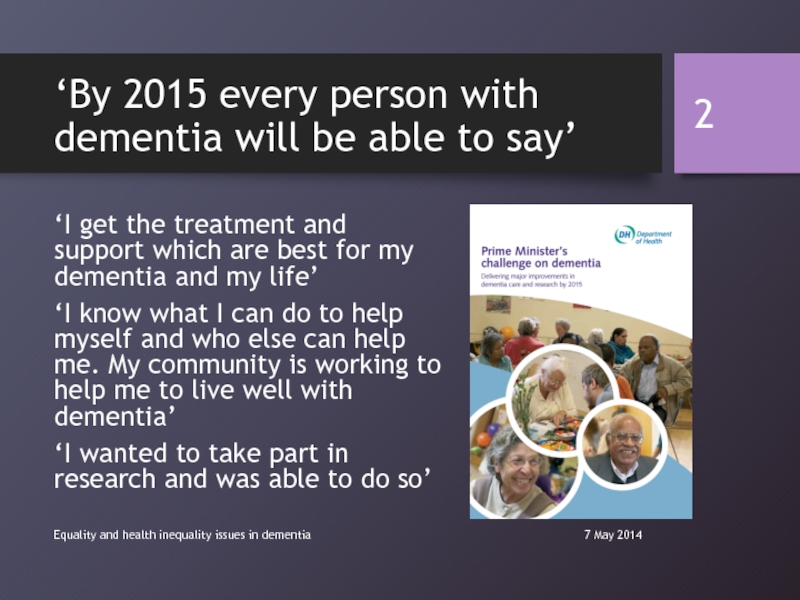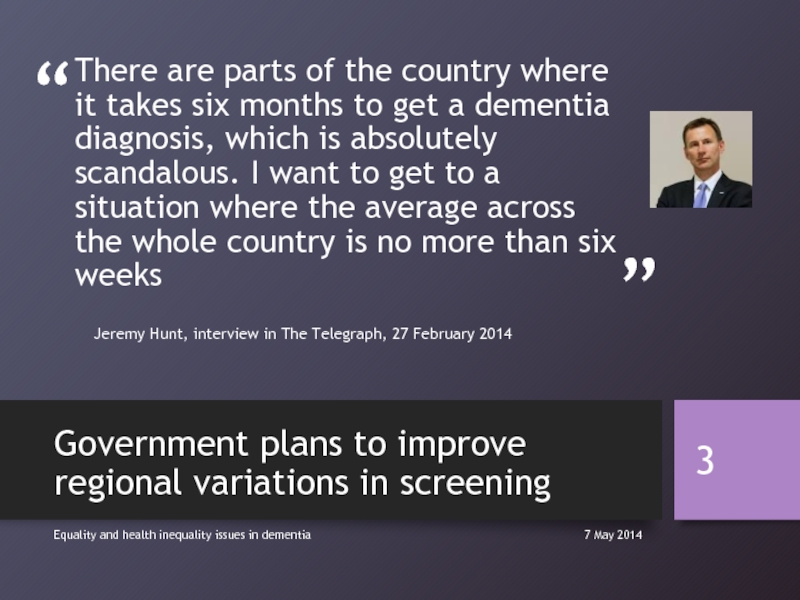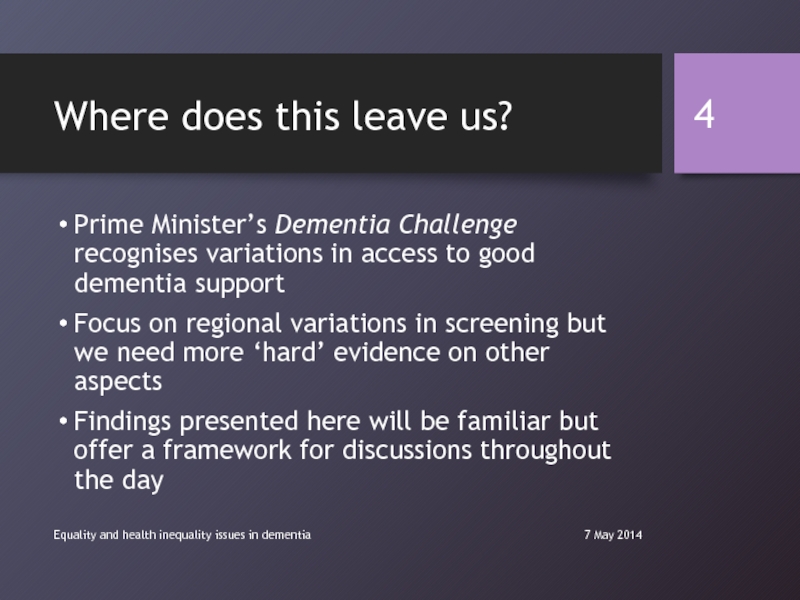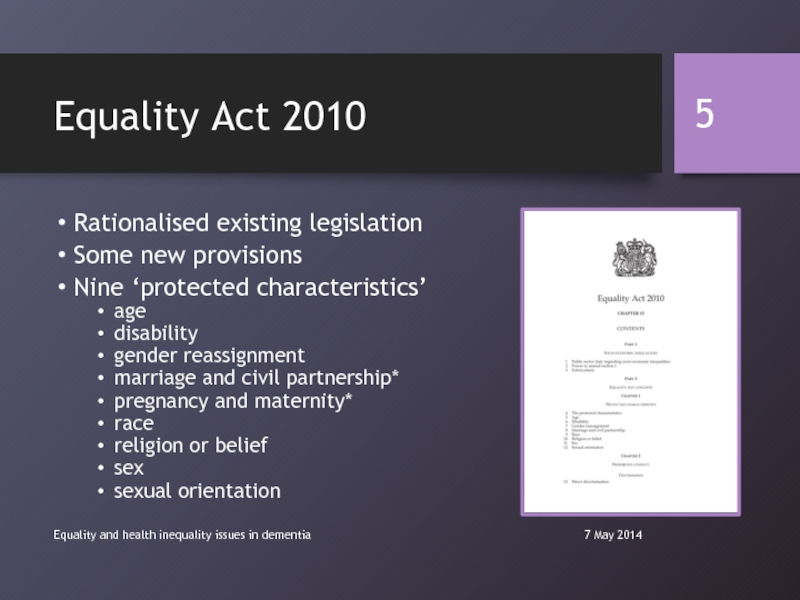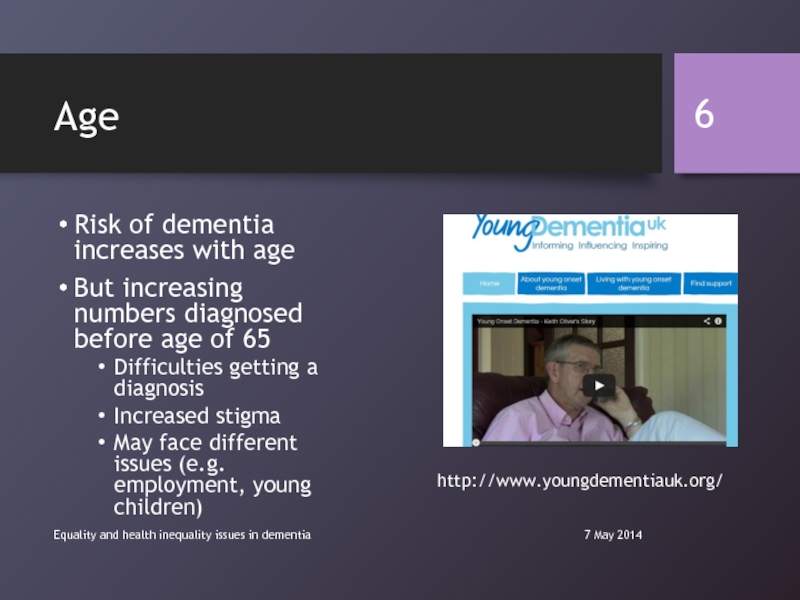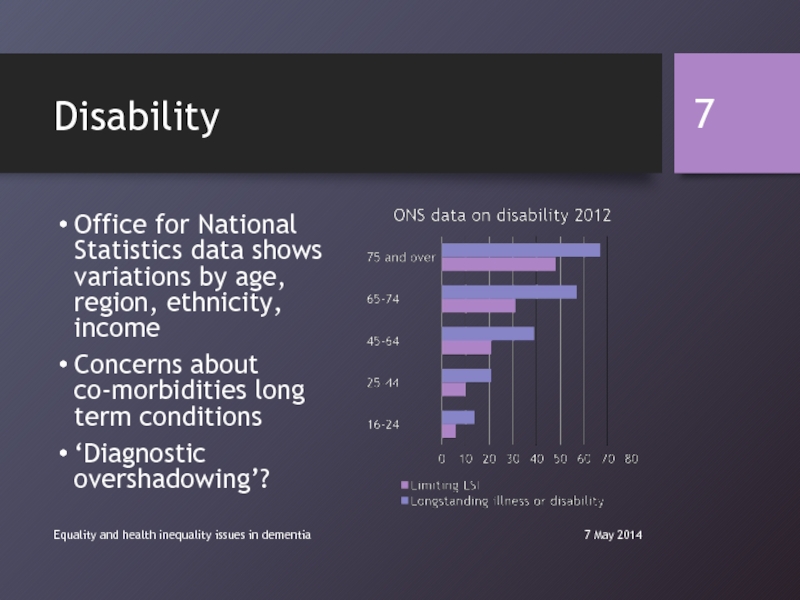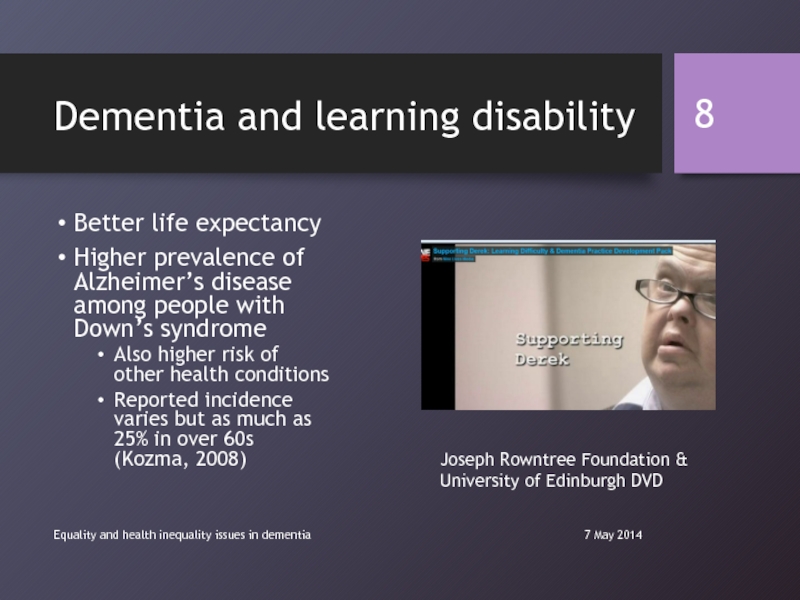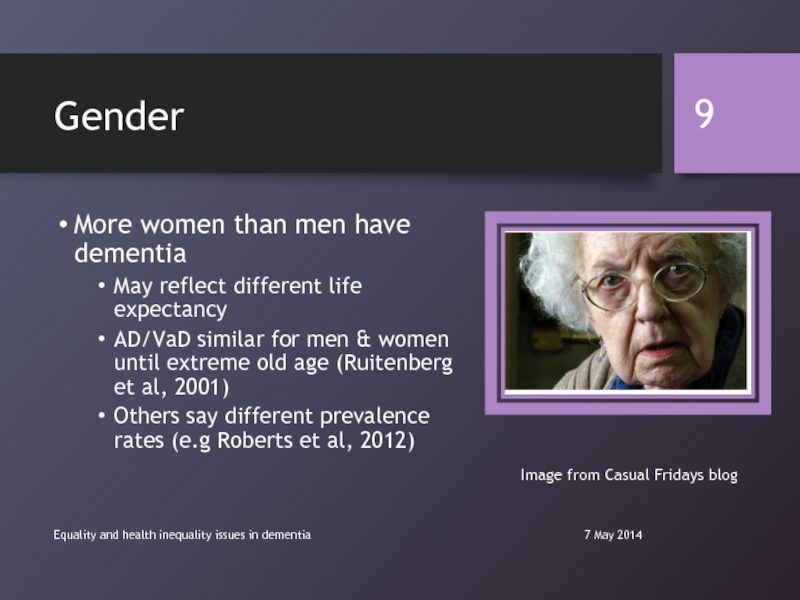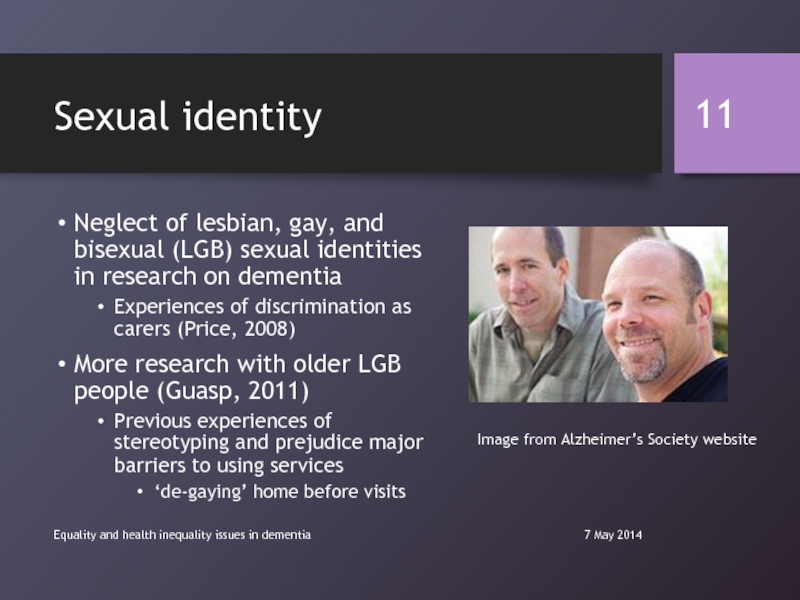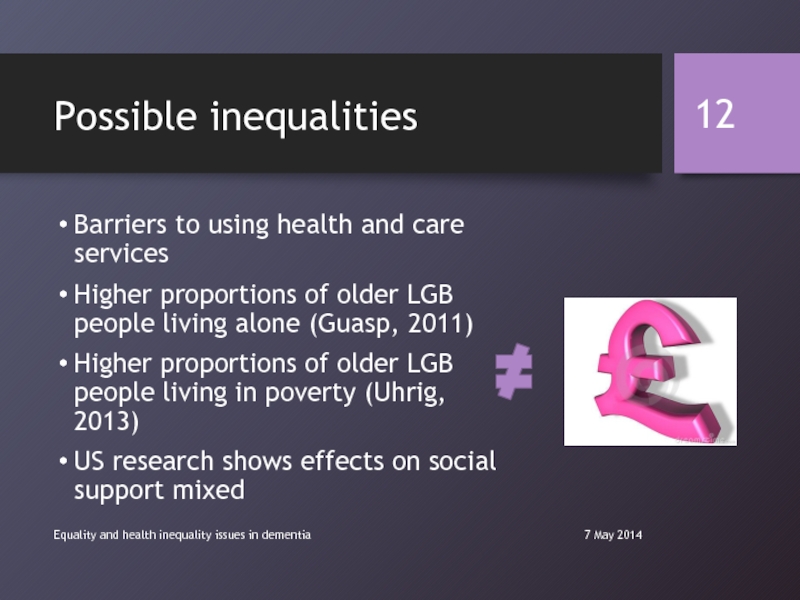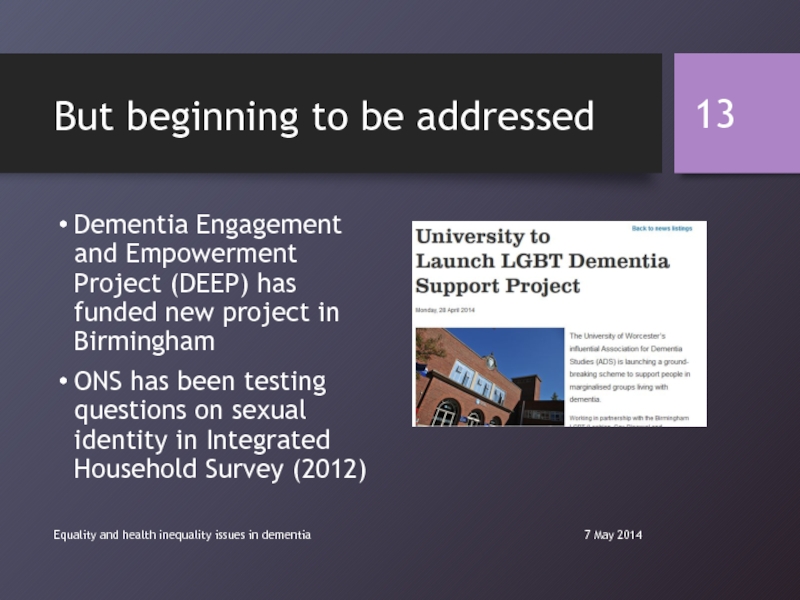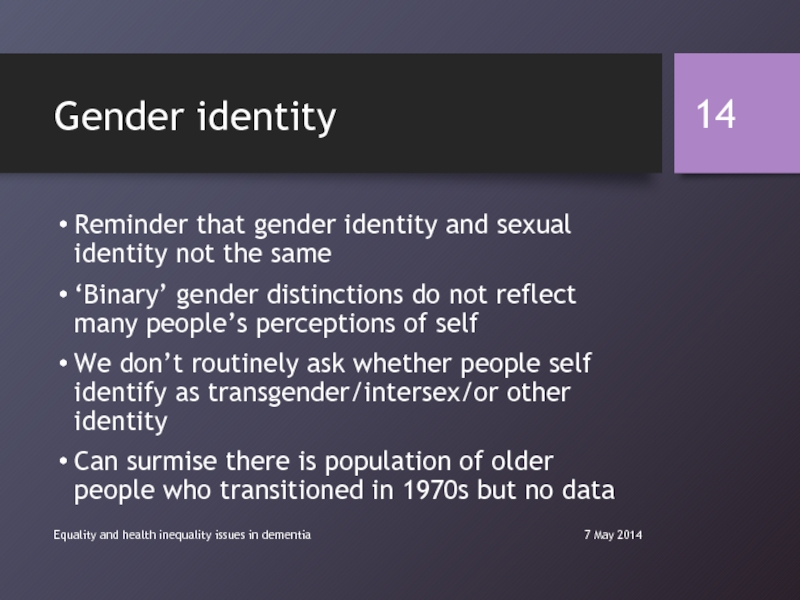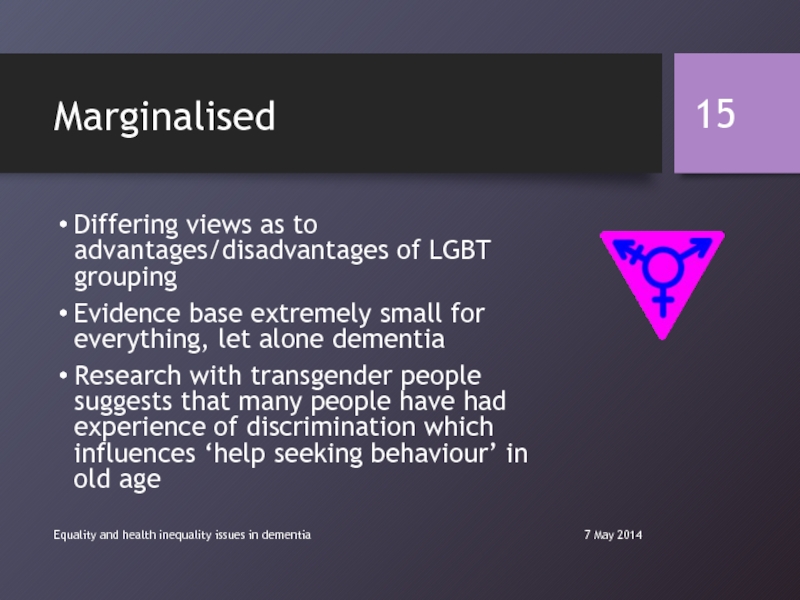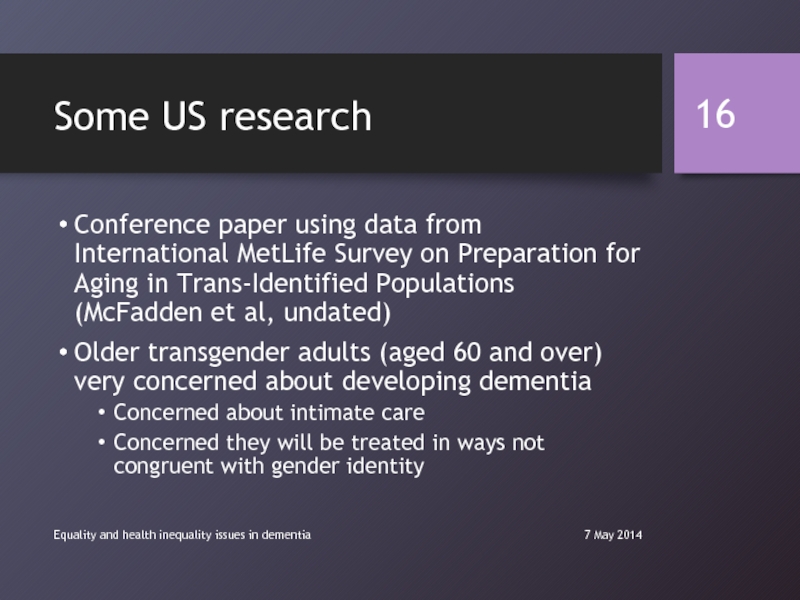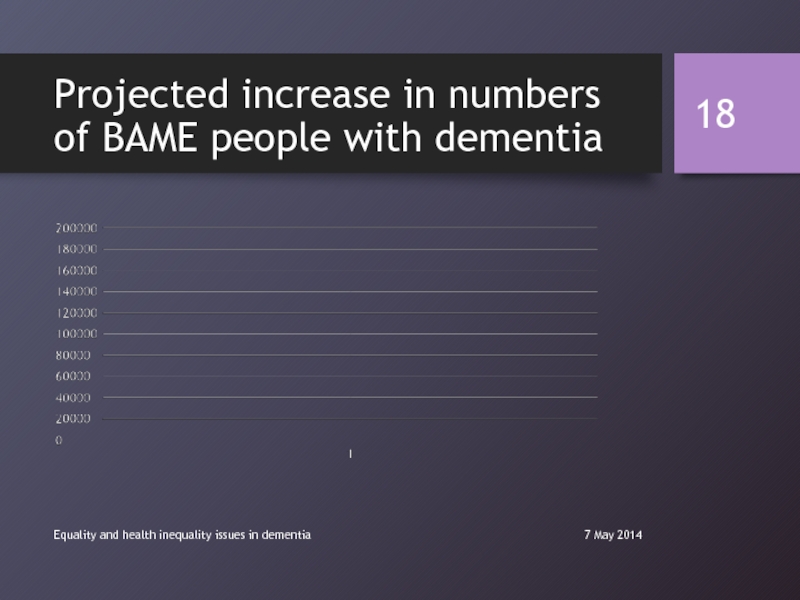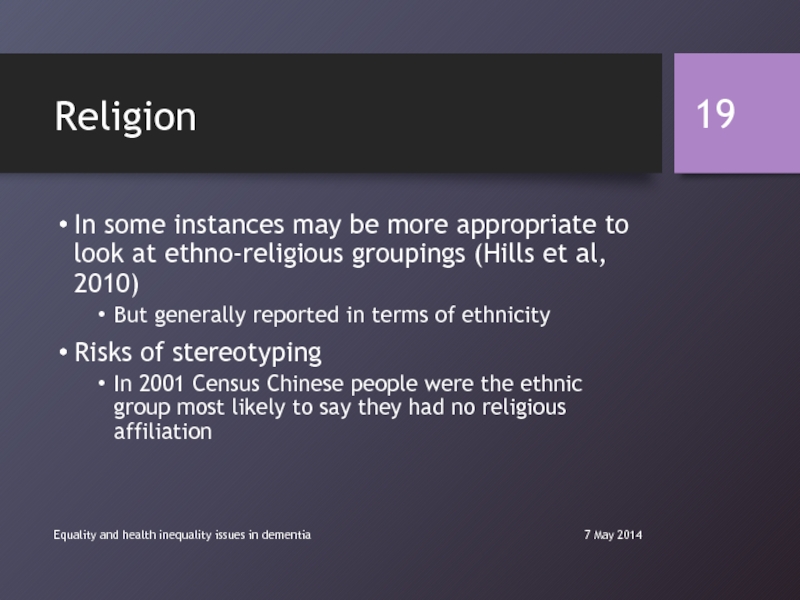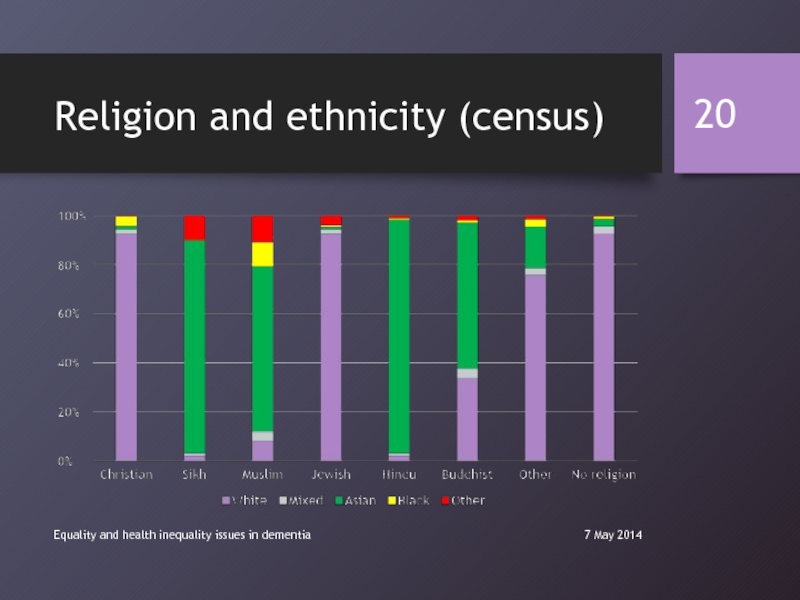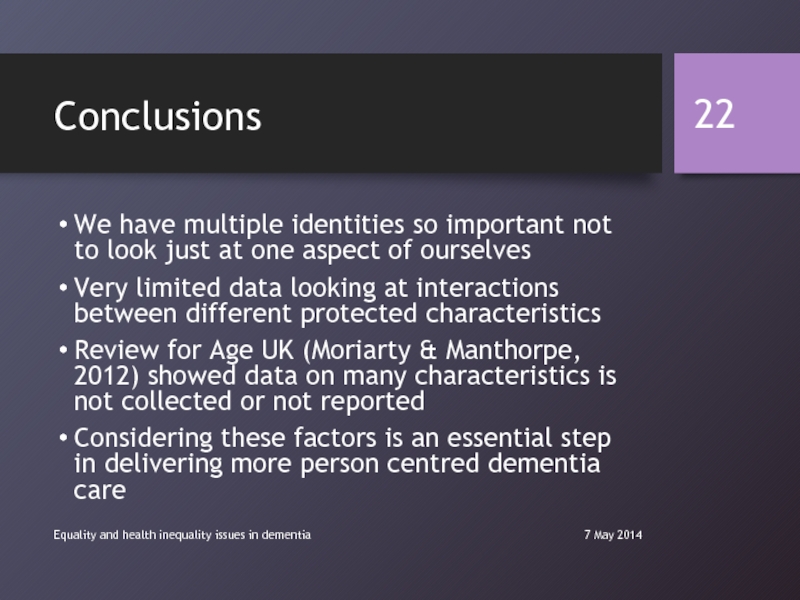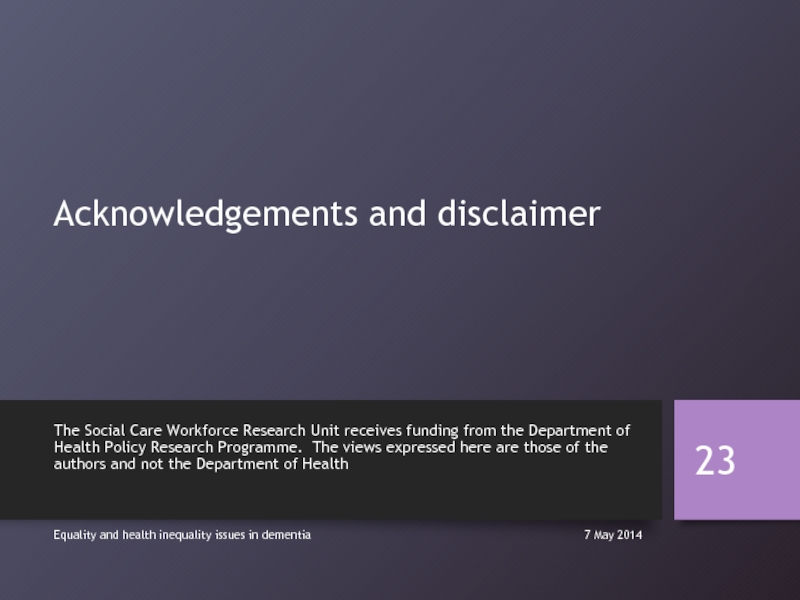- Главная
- Разное
- Дизайн
- Бизнес и предпринимательство
- Аналитика
- Образование
- Развлечения
- Красота и здоровье
- Финансы
- Государство
- Путешествия
- Спорт
- Недвижимость
- Армия
- Графика
- Культурология
- Еда и кулинария
- Лингвистика
- Английский язык
- Астрономия
- Алгебра
- Биология
- География
- Детские презентации
- Информатика
- История
- Литература
- Маркетинг
- Математика
- Медицина
- Менеджмент
- Музыка
- МХК
- Немецкий язык
- ОБЖ
- Обществознание
- Окружающий мир
- Педагогика
- Русский язык
- Технология
- Физика
- Философия
- Химия
- Шаблоны, картинки для презентаций
- Экология
- Экономика
- Юриспруденция
Overview of equality and health inequality issues and dementia презентация
Содержание
- 1. Overview of equality and health inequality issues and dementia
- 2. ‘By 2015 every person with dementia will
- 3. There are parts of the country where
- 4. Where does this leave us? Prime Minister’s
- 5. Rationalised existing legislation Some new provisions Nine
- 6. Age Risk of dementia increases with age
- 7. Disability Office for National Statistics data shows
- 8. Dementia and learning disability Better life expectancy
- 9. Gender More women than men have dementia
- 10. Sharpest differences in care homes? More women
- 11. Sexual identity Neglect of lesbian, gay, and
- 12. Possible inequalities Barriers to using health and
- 13. But beginning to be addressed Dementia Engagement
- 14. Gender identity Reminder that gender identity and
- 15. Marginalised Differing views as to advantages/disadvantages
- 16. Some US research Conference paper using data
- 17. Ethnicity Present later to services when dementia
- 18. Projected increase in numbers of BAME people
- 19. Religion In some instances may be more
- 20. Religion and ethnicity (census) 7 May 2014 Equality and health inequality issues in dementia
- 21. Socio-economic status Research in this area is
- 22. Conclusions We have multiple identities so important
- 23. Acknowledgements and disclaimer The Social Care Workforce
Слайд 1Overview of equality and health inequality issues and dementia
Jo Moriarty
Social Care
Слайд 2‘By 2015 every person with dementia will be able to say’
‘I
‘I know what I can do to help myself and who else can help me. My community is working to help me to live well with dementia’
‘I wanted to take part in research and was able to do so’
7 May 2014
Equality and health inequality issues in dementia
Слайд 3There are parts of the country where it takes six months
Jeremy Hunt, interview in The Telegraph, 27 February 2014
Government plans to improve regional variations in screening
7 May 2014
Equality and health inequality issues in dementia
Слайд 4Where does this leave us?
Prime Minister’s Dementia Challenge recognises variations in
Focus on regional variations in screening but we need more ‘hard’ evidence on other aspects
Findings presented here will be familiar but offer a framework for discussions throughout the day
7 May 2014
Equality and health inequality issues in dementia
Слайд 5Rationalised existing legislation
Some new provisions
Nine ‘protected characteristics’
age
disability
gender reassignment
marriage and civil partnership*
pregnancy
race
religion or belief
sex
sexual orientation
7 May 2014
Equality and health inequality issues in dementia
Equality Act 2010
Слайд 6Age
Risk of dementia increases with age
But increasing numbers diagnosed before age
Difficulties getting a diagnosis
Increased stigma
May face different issues (e.g. employment, young children)
7 May 2014
Equality and health inequality issues in dementia
http://www.youngdementiauk.org/
Слайд 7Disability
Office for National Statistics data shows variations by age, region, ethnicity,
Concerns about co-morbidities long term conditions
‘Diagnostic overshadowing’?
7 May 2014
Equality and health inequality issues in dementia
Слайд 8Dementia and learning disability
Better life expectancy
Higher prevalence of Alzheimer’s disease
Also higher risk of other health conditions
Reported incidence varies but as much as 25% in over 60s (Kozma, 2008)
7 May 2014
Equality and health inequality issues in dementia
Joseph Rowntree Foundation & University of Edinburgh DVD
Слайд 9Gender
More women than men have dementia
May reflect different life expectancy
AD/VaD similar
Others say different prevalence rates (e.g Roberts et al, 2012)
7 May 2014
Equality and health inequality issues in dementia
Image from Casual Fridays blog
Слайд 10Sharpest differences in care homes?
More women than men live in care
Women tend to marry men older than them and to live longer
Poverty rates worse among ‘single’ women households
About 80% social care workforce are women
7 May 2014
Equality and health inequality issues in dementia
Image Scottish Parliament website
Слайд 11Sexual identity
Neglect of lesbian, gay, and bisexual (LGB) sexual identities in
Experiences of discrimination as carers (Price, 2008)
More research with older LGB people (Guasp, 2011)
Previous experiences of stereotyping and prejudice major barriers to using services
‘de-gaying’ home before visits
Equality and health inequality issues in dementia
Image from Alzheimer’s Society website
7 May 2014
Слайд 12Possible inequalities
Barriers to using health and care services
Higher proportions of older
Higher proportions of older LGB people living in poverty (Uhrig, 2013)
US research shows effects on social support mixed
7 May 2014
Equality and health inequality issues in dementia
Слайд 13But beginning to be addressed
Dementia Engagement and Empowerment Project (DEEP) has
ONS has been testing questions on sexual identity in Integrated Household Survey (2012)
7 May 2014
Equality and health inequality issues in dementia
Слайд 14Gender identity
Reminder that gender identity and sexual identity not the same
‘Binary’
We don’t routinely ask whether people self identify as transgender/intersex/or other identity
Can surmise there is population of older people who transitioned in 1970s but no data
7 May 2014
Equality and health inequality issues in dementia
Слайд 15Marginalised
Differing views as to advantages/disadvantages of LGBT grouping
Evidence base extremely
Research with transgender people suggests that many people have had experience of discrimination which influences ‘help seeking behaviour’ in old age
7 May 2014
Equality and health inequality issues in dementia
Слайд 16Some US research
Conference paper using data from International MetLife Survey on
Older transgender adults (aged 60 and over) very concerned about developing dementia
Concerned about intimate care
Concerned they will be treated in ways not congruent with gender identity
7 May 2014
Equality and health inequality issues in dementia
Слайд 17Ethnicity
Present later to services when dementia is more severe (Mukadam et
Knowledge about dementia appears to be less (Seabrooke & Milne, 2009)
Stigma may be greater (LaFontaine, 2007)
Carers may experience particular difficulties (Bowes & Wilkinson, 2003)
7 May 2014
Equality and health inequality issues in dementia
Image from 2009 Dementia Strategy
Слайд 18Projected increase in numbers of BAME people with dementia
7 May 2014
Equality
Слайд 19Religion
In some instances may be more appropriate to look at ethno-religious
But generally reported in terms of ethnicity
Risks of stereotyping
In 2001 Census Chinese people were the ethnic group most likely to say they had no religious affiliation
7 May 2014
Equality and health inequality issues in dementia
Слайд 21Socio-economic status
Research in this area is mainly from the US
Suggests there
Education as a ‘protective’ factor?
Poorer physical and mental health throughout the life course?
7 May 2014
Equality and health inequality issues in dementia
Слайд 22Conclusions
We have multiple identities so important not to look just at
Very limited data looking at interactions between different protected characteristics
Review for Age UK (Moriarty & Manthorpe, 2012) showed data on many characteristics is not collected or not reported
Considering these factors is an essential step in delivering more person centred dementia care
7 May 2014
Equality and health inequality issues in dementia
Слайд 23Acknowledgements and disclaimer
The Social Care Workforce Research Unit receives funding from
7 May 2014
Equality and health inequality issues in dementia
